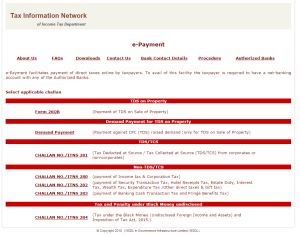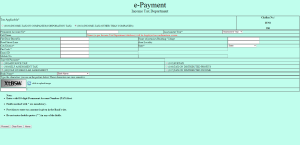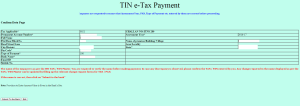Find out what will be the penalty for late payment or not depositing advance income tax on time? Section 234A, 234B and 234C of the Income Tax deal with the penalty for not paying income tax liability on time.
Summary of Section 234A, 234B and 234C of the Income Tax Act,1961: Rate of interest for late payment of income tax .i.e filing of return after due date, advance tax and deferment of advance tax.
|
Filling of return after due date u/s 234A
|
Interest @ 1% per month or part of the month from the end of Due Date for filling of return till the date of furnishing of return
|
|
Defaults in payment of advance Tax u/s 234B
|
Interest @ 1% per month or part of the month the 1st day of April next following financial year to the date of determination of total income under section 143(1) and where a regular assessment, to the date of such regular assessment
Interest is payable if advance tax paid by the assessee during the previous year is less than 90% of the assessed tax.
|
|
Deferment in payment of advance Tax u/s 234C
|
Interest @ 1% per month or part of the month on the deficit amount as applicable.
Interest is payable if advance tax paid on due date is less than specified percentage ( see table of advance income tax)
|
Reference: Section 234A of the Income Tax Act, 1961
Interest for defaults in furnishing return of income
(1) Where the return of income for any assessment year under sub-section (1) or sub-section (4) of section 139, or in response to a notice under sub-section (1) of section 142, is furnished after the due date, or is not furnished, the assessee shall be liable to pay simple interest at the rate of [one] per cent for every month or part of a month comprised in the period commencing on the date immediately following the due date, and,—
(a) where the return is furnished after the due date, ending on the date of furnishing of the return; or
(b) where no return has been furnished, ending on the date of completion of the assessment under section 144,
on the amount of the tax on the total income as determined under sub-section (1) of section 143, and where a regular assessment is made, on the amount of the tax on the total income determined under regular assessment, as reduced by the amount of,—
(i) advance tax, if any, paid;
(ii) any tax deducted or collected at source;
(iii) any relief of tax allowed under section 90 on account of tax paid in a country outside India;
(iv) any relief of tax allowed under section 90A on account of tax paid in a specified territory outside India referred to in that section;
(v) any deduction, from the Indian income-tax payable, allowed under section 91, on account of tax paid in a country outside India; and
(vi) any tax credit allowed to be set off in accordance with the provisions of section 115JAA or section 115JD
Explanation 1.—In this section, “due date” means the date specified in sub-section (1) of section 139 as applicable in the case of the assessee.
Explanation 2.—In this sub-section, “tax on the total income as determined under sub-section (1) of section 143” shall not include the additional income-tax, if any, payable under section 143.
Explanation 3.—Where, in relation to an assessment year, an assessment is made for the first time under section 147 or section 153A, the assessment so made shall be regarded as a regular assessment for the purposes of this section.
Explanation 4.—
(2) The interest payable under sub-section (1) shall be reduced by the interest, if any, paid under section 140A towards the interest chargeable under this section.
(3) Where the return of income for any assessment year, required by a notice under section 148 or section 153A issued after the determination of income under sub-section (1) of section 143 or after the completion of an assessment under sub-section (3) of section 143 or section 144 or section 147, is furnished after the expiry of the time allowed under such notice, or is not furnished, the assessee shall be liable to pay simple interest at the rate of [one] per cent for every month or part of a month comprised in the period commencing on the day immediately following the expiry of the time allowed as aforesaid, and,—
(a) where the return is furnished after the expiry of the time aforesaid, ending on the date of furnishing the return; or
(b) where no return has been furnished, ending on the date of completion of the reassessment or recomputation under section 147 [or reassessment under section 153A],
on the amount by which the tax on the total income determined on the basis of such reassessment or recomputation exceeds the tax on the total income determined under sub-section (1) of section 143 or on the basis of the earlier assessment aforesaid.
Explanation.—
(4) Where as a result of an order under section 154 or section 155 or section 250 or section 254 or section 260 or section 262 or section 263 or section 264 or an order of the Settlement Commission under sub-section (4) of section 245D, the amount of tax on which interest was payable under sub-section (1) or sub-section (3) of this section has been increased or reduced, as the case may be, the interest shall be increased or reduced accordingly, and—
(i) in a case where the interest is increased, the Assessing Officer shall serve on the assessee a notice of demand in the prescribed form specifying the sum payable, and such notice of demand shall be deemed to be a notice under section 156 and the provisions of this Act shall apply accordingly;
(ii) in a case where the interest is reduced, the excess interest paid, if any, shall be refunded.
(5) The provisions of this section shall apply in respect of assessments for the assessment year commencing on the 1st day of April, 1989 and subsequent assessment years.
Reference: Section 234B of the Income Tax Act, 1961
Interest for defaults in payment of advance tax
(1) Subject to the other provisions of this section, where, in any financial year, an assessee who is liable to pay advance tax under section 208 has failed to pay such tax or, where the advance tax paid by such assessee under the provisions of section 210 is less than ninety per cent of the assessed tax, the assessee shall be liable to pay simple interest at the rate of 1 per cent for every month or part of a month comprised in the period from the 1st day of April next following such financial year to the date of determination of total income under sub-section (1) of section 143 and where a regular assessment is made, to the date of such regular assessment, on an amount equal to the assessed tax or, as the case may be, on the amount by which the advance tax paid as aforesaid falls short of the assessed tax.
Explanation 1.—In this section, “assessed tax” means the tax on the total income determined under sub-section (1) of section 143 and where a regular assessment is made, the tax on the total income determined under such regular assessment as reduced by the amount of,—
(i) any tax deducted or collected at source in accordance with the provisions of Chapter XVII on any income which is subject to such deduction or collection and which is taken into account in computing such total income;
(ii) any relief of tax allowed under section 90 on account of tax paid in a country outside India;
(iii) any relief of tax allowed under section 90A on account of tax paid in a specified territory outside India referred to in that section;
(iv) any deduction, from the Indian income-tax payable, allowed under section 91, on account of tax paid in a country outside India; and
(v) any tax credit allowed to be set off in accordance with the provisions of section 115JAA or section 115JD
Explanation 2.—Where, in relation to an assessment year, an assessment is made for the first time under section 147 or section 153A], the assessment so made shall be regarded as a regular assessment for the purposes of this section.
Explanation 3.—In Explanation 1 and in sub-section (3) “tax on the total income determined under sub-section (1) of section 143” shall not include the additional income-tax, if any, payable under section 143.]
(2) Where, before the date of determination of total income under sub-section (1) of section 143 or] completion of a regular assessment, tax is paid by the assessee under section 140A or otherwise,—
(i) interest shall be calculated in accordance with the foregoing provisions of this section up to the date on which the tax is so paid, and reduced by the interest, if any, paid under section 140A towards the interest chargeable under this section;
(ii) thereafter, interest shall be calculated at the rate aforesaid on the amount by which the tax so paid together with the advance tax paid falls short of the assessed tax.
(3) Where, as a result of an order of reassessment or recomputation under section 147 or section 153A, the amount on which interest was payable under sub-section (1) is increased, the assessee shall be liable to pay simple interest at the rate of one per cent for every month or part of a month comprised in the period commencing on the day following the date of determination of total income under sub-section (1) of section 143 and where a regular assessment is made as is referred to in sub-section (1) following the date of such regular assessment]] and ending on the date of the reassessment or recomputation under section 147 or section 153A], on the amount by which the tax on the total income determined on the basis of the reassessment or recomputation exceeds the tax on the total income determined under sub-section (1) of section 143 or] on the basis of the regular assessment aforesaid.
Explanation.–
(4) Where, as a result of an order under section 154 or section 155 or section 250 or section 254 or section 260 or section 262 or section 263 or section 264 or an order of the Settlement Commission under sub-section (4) of section 245D, the amount on which interest was payable under sub-section (1) or sub-section (3) has been increased or reduced, as the case may be, the interest shall be increased or reduced accordingly, and—
(i) in a case where the interest is increased, the Assessing Officer shall serve on the assessee a notice of demand in the prescribed form specifying the sum payable and such notice of demand shall be deemed to be a notice under section 156 and the provisions of this Act shall apply accordingly;
(ii) in a case where the interest is reduced, the excess interest paid, if any, shall be refunded.
(5) The provisions of this section shall apply in respect of assessments for the assessment year commencing on the 1st day of April, 1989 and subsequent assessment years.]
Reference: Section 234C of the Income Tax Act, 1961
Interest for deferment of advance tax
Where in any financial year,—
(a) the company which is liable to pay advance tax under section 208 has failed to pay such tax or—
(i) the advance tax paid by the company on its current income on or before the 15th day of June is less than fifteen per cent of the tax due on the returned income or the amount of such advance tax paid on or before the 15th day of September is less than forty-five per cent of the tax due on the returned income or the amount of such advance tax paid on or before the 15th day of December is less than seventy-five per cent of the tax due on the returned income, then, the company shall be liable to pay simple interest at the rate of one per cent per month for a period of three months on the amount of the shortfall from fifteen per cent or forty-five per cent or seventy-five per cent, as the case may be, of the tax due on the returned income;
(ii) the advance tax paid by the company on its current income on or before the 15th day of March is less than the tax due on the returned income, then, the company shall be liable to pay simple interest at the rate of one per cent on the amount of the shortfall from the tax due on the returned income:
Provided that if the advance tax paid by the company on its current income on or before the 15th day of June or the 15th day of September, is not less than twelve per cent or, as the case may be, thirty-six per cent of the tax due on the returned income, then, it shall not be liable to pay any interest on the amount of the shortfall on those dates;
(b) the assessee, other than a company, who is liable to pay advance tax under section 208 has failed to pay such tax or,—
(i) the advance tax paid by the assessee on his current income on or before the 15th day of September is less than thirty per cent of the tax due on the returned income or the amount of such advance tax paid on or before the 15th day of December is less than sixty per cent of the tax due on the returned income, then, the assessee shall be liable to pay simple interest at the rate of one per cent per month for a period of three months on the amount of the shortfall from thirty per cent or, as the case may be, sixty per cent of the tax due on the returned income;
(ii) the advance tax paid by the assessee on his current income on or before the 15th day of March is less than the tax due on the returned income, then, the assessee shall be liable to pay simple interest at the rate of one per cent on the amount of the shortfall from the tax due on the returned income :
Provided that nothing contained in this sub-section shall apply to any shortfall in the payment of the tax due on the returned income where such shortfall is on account of under-estimate or failure to estimate—
(a) the amount of capital gains; or
(b) income of the nature referred to in sub-clause (ix) of clause (24) of section 2,
and the assessee has paid the whole of the amount of tax payable in respect of income referred to in clause (a) or clause (b), as the case may be, had such income been a part of the total income, as part of the remaining instalments of advance tax which are due or where no such instalments are due], by the 31st day of March of the financial year:]
Provided further that nothing contained in this sub-section shall apply to any shortfall in the payment of the tax due on the returned income where such shortfall is on account of increase in the rate of surcharge under section 2 of the Finance Act, 2000 (10 of 2000), as amended by the Taxation Laws (Amendment) Act, 2000 (1 of 2001), and the assessee has paid the amount of shortfall, on or before the 15th day of March, 2001 in respect of the instalment of advance tax due on the 15th day of June, 2000, the 15th day of September, 2000 and the 15th day of December, 2000 :
Provided also that nothing contained in this sub-section shall apply to any shortfall in the payment of the tax due on the returned income where such shortfall is on account of increase in the rate of surcharge under section 2 of the Finance Act, 2000 (10 of 2000) as amended by the Taxation Laws (Amendment) Act, 2001 (4 of 2001) and the assessee has paid the amount of shortfall on or before the 15th day of March, 2001 in respect of the instalment of advance tax due on the 15th day of June, 2000, the 15th day of September, 2000 and 15th day of December, 2000.
Explanation.—In this section, “tax due on the returned income” means the tax chargeable on the total income declared in the return of income furnished by the assessee for the assessment year commencing on the 1st day of April immediately following the financial year in which the advance tax is paid or payable, as reduced by the amount of,—
(i) any tax deductible or collectible at source in accordance with the provisions of Chapter XVII on any income which is subject to such deduction or collection and which is taken into account in computing such total income;
(ii) any relief of tax allowed under section 90 on account of tax paid in a country outside India;
(iii) any relief of tax allowed under section 90A on account of tax paid in a specified territory outside India referred to in that section;
(iv) any deduction, from the Indian income-tax payable, allowed under section 91, on account of tax paid in a country outside India; and
(v) any tax credit allowed to be set off in accordance with the provisions of section 115JAA or section 115JD
(2) The provisions of this section shall apply in respect of assessments for the assessment year commencing on the 1st day of April, 1989 and subsequent assessment years.


